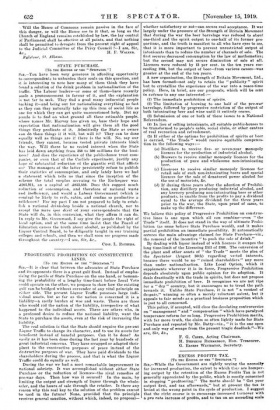STATE PURCHASE.
[To THE EDITOR OF THE 'SPECTATOR."] Sia.—You have been very generous in affording opportunity to correspondents to unburden their souls on this question, and it is interesting to note how many of them think they have found a solution of the drink problem in nationalization of the traffic. The Labour leaders—or some of them—have recently made a pronouncement in favour of it, and the explanation is not far to seek. They find a good many influential people backing it—and being out for nationalizing everything as fast as they can they naturally take up this item of social life as one for which they can get quite unaccustomed help. But my puzzle is to find on what ground all these estimable people, whose names Mr. Harvey has given us, base their hope and expectation that nationalization will- give them all the good things they predicate of it. Admittedly the State as owner can do these things if it will, but will it? They can be done equally well as things are if there is the will. No, say our friends, they cannot, because vested private interests block the way. Will there be no vested interest when the State has laid down anything from 350 to 500 millions for the busi- ness? And does the experience of the public-house trust com- panies, or even that of the Carlisle experiment-, justify any hope of substantial reduction of the gigantic evil that afflicts us? The managers of the latter persistently refuse to publish their statistics of consumption, and only lately have we had a statement which tells us that since the inception of the scheme the total surplus accruing to the Exchequer was £203,911, on a capital of 4.1353,550. Does this suggest much reduction of consumption, and therefore of national waste and inefficiency, and would a Labour Government (which is coming) be likely to crib, cabin, and confine so productive a mileh-cow? For my part I am not prepared to help to estab- lish a national drinkshop beside a national church, nor to accept the mere ipse dixit of your correspondents that the State will do, in this connexion, what they affirm it can do. In reply to Mr. Greenwood, I say give the people the right of local option, and at the same time insist that the Board of Education causes the truth about alcohol, as pitiilished by the Liquor Control Board, to be diligently taught in our training colleges and schools, and then we shall 60011 see progress made throughout the country.—I am, Sir, &c., CHAS. L. ROTHERA.






































 Previous page
Previous page